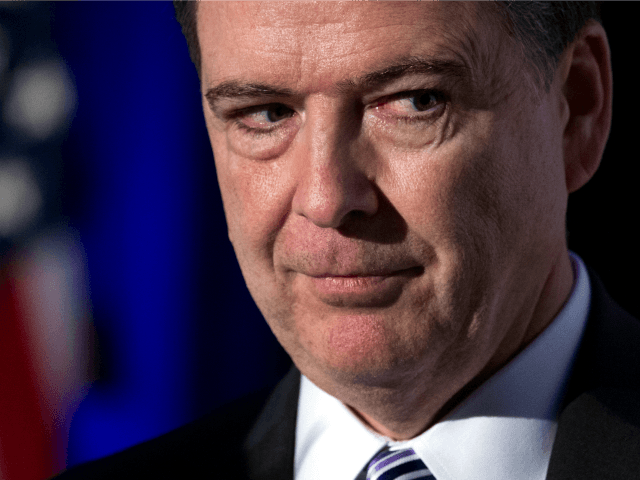Former FBI Director James B. Comey admitted that he pushed back against a request from President Donald Trump to possibly investigate the origins of “salacious material” that the agency possessed in the course of its investigation into alleged Russian interference in the 2016 presidential campaign.
The detail was included in Comey’s prepared remarks set to be delivered Thursday to the U.S. Senate Select Committee on Intelligence and released ahead of Comey’s appearance.
The “salacious material” is clearly a reference to claims made inside the controversial, partially discredited 35-page dossier that reportedly served as a “roadmap” for the FBI’s investigation into unsubstantiated charges of coordination between Moscow and members of Trump’s presidential campaign.
The dossier also reportedly served as the FBI’s justification for seeking court approval to clandestinely monitor Carter Page, who was formerly tangentially involved with Trump’s campaign.
In Comey’s prepared remarks, the former FBI chief says that following a January 6 Oval Office meeting with Intelligence Community leaders, Comey “remained alone with the President Elect to brief him on some personally sensitive aspects of the information assembled during the assessment.”’
It is clear Comey was referring to the dossier since he writes the “salacious and unverified” material was about to be publically reported by the news media.
He writes:
The IC leadership thought it important, for a variety of reasons, to alert the incoming President to the existence of this material, even though it was salacious and unverified. Among those reasons were: (1) we knew the media was about to publicly report the material and we believed the IC should not keep knowledge of the material and its imminent release from the President-Elect; and (2) to the extent there was some effort to compromise an incoming President, we could blunt any such effort with a defensive briefing.
Four days later, the dossier was published by BuzzFeed.
Also, in his statement summarizing his conversation with Trump, Comey refers to Russian prostitutes, a key component of the dossier:
He said he had nothing to do with Russia, had not been involved with hookers in Russia, and had always assumed he was being recorded when in Russia.
In a private White House dinner with Trump on January 27, Comey says the topic of the “salacious material” again came up and he reveals that Trump was considering asking the FBI to investigate the origins of the claims. Comey pushed back against that idea.
Comey writes:
During the dinner, the President returned to the salacious material I had briefed him about on January 6, and, as he had done previously, expressed his disgust for the allegations and strongly denied them. He said he was considering ordering me to investigate the alleged incident to prove it didn’t happen. I replied that he should give that careful thought because it might create a narrative that we were investigating him personally, which we weren’t, and because it was very difficult to prove a negative. He said he would think about it and asked me to think about it.
The dossier in question was authored by former intelligence agent Christopher Steele, who was reportedly paid by Democrats and anti-Trump Republicans to investigate Trump, raising questions about his partiality.
Last month, Steele conceded in court documents that part of his work still needed to be verified.
The document contains wild and unproven claims that the Russians had information on Trump and sordid sexual acts, including the mocked claim that Trump hired prostitutes and had them urinate on a hotel room bed.
In testimony before the Senate Judiciary Committee on FBI oversight last month, Comey repeatedly refused to answer questions about his agency’s ties to the dossier.
Citing current and former government officials, the New Yorker reported the dossier prompted skepticism in the intelligence community, with the publication quoting one member as saying it was a “nutty” piece of evidence to submit to a U.S. president.
Steele’s work has been questioned by former acting CIA director Morell, who currently works at the Hillary Clinton-tied Beacon Global Strategies LLC. Beacon was founded by Phillippe Reines, who served as Communications Adviser to Hillary Clinton while she was secretary of state. From 2009-2013, Reines also served in Clinton’s State Department as the Deputy Assistant Secretary of State for Strategic Communications. Reines is the managing director of Beacon.
Aaron Klein is Breitbart’s Jerusalem bureau chief and senior investigative reporter. He is a New York Times bestselling author and hosts the popular weekend talk radio program, “Aaron Klein Investigative Radio.” Follow him on Twitter @AaronKleinShow. Follow him on Facebook.
With research by Joshua Klein.

COMMENTS
Please let us know if you're having issues with commenting.